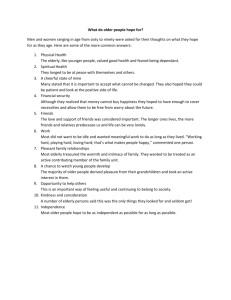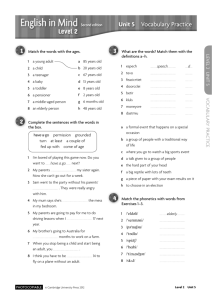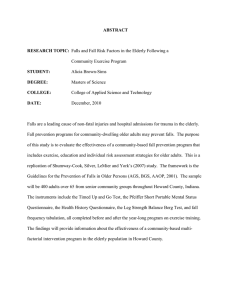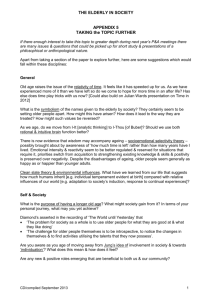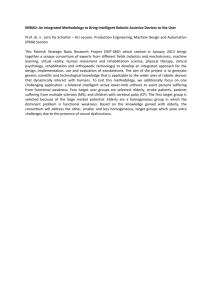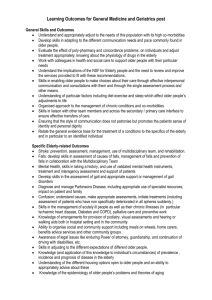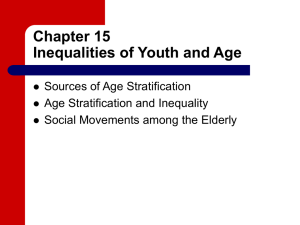Care of Elderly Definitions Ageing
advertisement
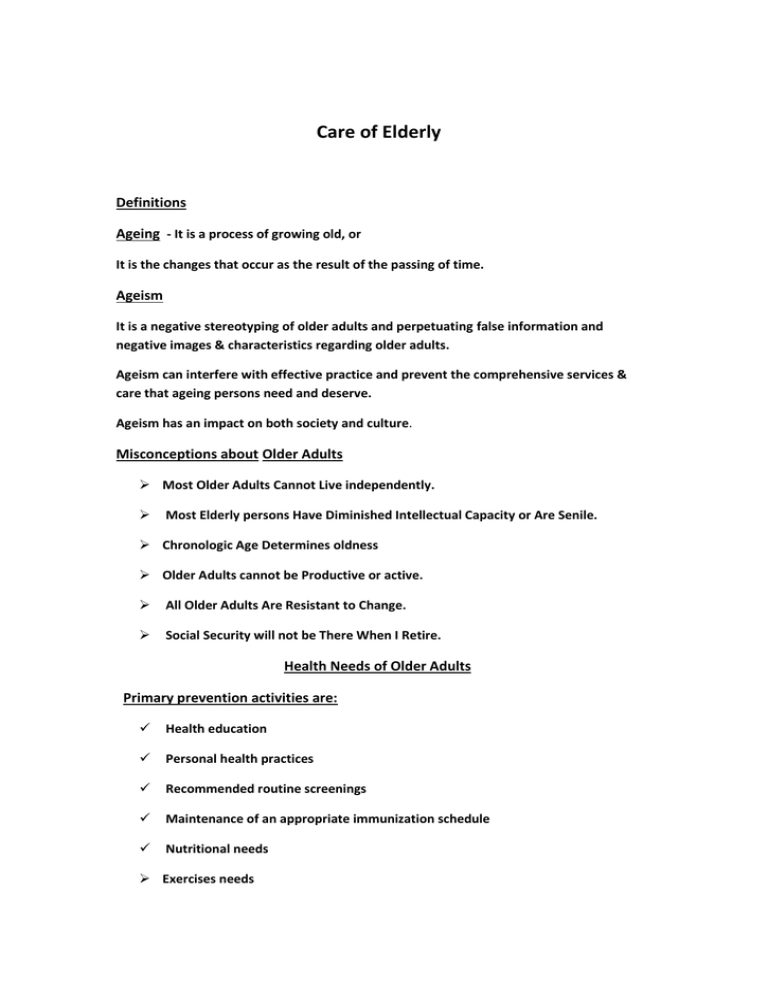
Care of Elderly Definitions Ageing - It is a process of growing old, or It is the changes that occur as the result of the passing of time. Ageism It is a negative stereotyping of older adults and perpetuating false information and negative images & characteristics regarding older adults. Ageism can interfere with effective practice and prevent the comprehensive services & care that ageing persons need and deserve. Ageism has an impact on both society and culture. Misconceptions about Older Adults Most Older Adults Cannot Live independently. Most Elderly persons Have Diminished Intellectual Capacity or Are Senile. Chronologic Age Determines oldness Older Adults cannot be Productive or active. All Older Adults Are Resistant to Change. Social Security will not be There When I Retire. Health Needs of Older Adults Primary prevention activities are: Health education Personal health practices Recommended routine screenings Maintenance of an appropriate immunization schedule Nutritional needs Exercises needs Economic security needs Psychosocial needs Safety needs which include: - Personal health and safety - Home safety - Community safety Secondary prevention Secondary prevention focuses on early detection of disease & prompt intervention. It includes following the Routine health screening schedule for diseases. Tertiary Prevention It involves follow up & rehabilitation after a disease has occurred or been diagnosed and initial treatment has begun. Note - Chronic diseases are common among elderly Four primary criteria for an effective community health programs for the elderly Comprehensive Coordination Accessibility Promote quality programs Services for the well Elderly Needs assessment forms the basis for determining approach services. Although most of the well elderly can assess their own health status, many are reluctant to seek needed help. Thus outreach programs serve an important function in many communities. They locate elderly persons in need of social assistance and refer them to appropriate resources. Health maintenance programs may be offered through a single agency, such as health maintenance organization, or coordinated with referral to other providers. These programs should cover a wide range of health services needed by the elderly, e.g. of such services are: Dental care Vision tests and eye glasses Hearing tests and hearing aid assistance Exercise and fitness programs Speech or physical therapy Home health services, including skilled nursing and home health aid services. Routine medical care Medical supplies or equipment Health education Medication supervision Role of the nurse in the care of the elderly Nurses must analyze and capitalize on the elderly's strength, to enable the older people to thrive, not merely to survive. Change to a healthier life style is one of the most important preventive measures the nurse can emphasize. E.g. stopping smoking, eating regular and well balanced meals, exercising regularly. Educating the elderly about their health conditions and use of their medications is another important way to prevent problems. Educating the family to care for the elderly and to involve them in the family decision making can improve their self-esteem. Periodic health examinations to be done for early detection of chronic conditions. Nurses must provide knowledge about normal development al needs throughout life-span. Community health nurses must encourage planned activities and programs, satisfying interpersonal relationships, quality of housing, adequate income to promote increased self-esteem. Community health nurses can provide counseling to the abused elderly and the abusers and teaching stress management techniques. Community health nurses must be active during the stages of crisis. Encourage the older people to be in touch with appropriate community resources can do much to relieve the source of stress and actively participate in community functions. During grief nurses must provide correct information, create a sense of reality, supportive listening, and caring during periods of crying and other emotional releases are essential aspect of the care activities.
